
Heartburn & Stomach Ache Quiz
1. Do both symptoms occur after the same meal or trigger?
2. Is the stomach ache accompanied by nausea or bloating?
3. Does the heartburn happen mainly after lying down or bending over?
4. Have you experienced vomiting blood or black stools?
5. Are you experiencing unexplained weight loss?
When you feel a nagging heartburn a burning sensation behind the breastbone caused by acid rising into the esophagus and a crampy stomach ache pain or discomfort in the abdominal area, often linked to digestion, it’s easy to wonder if they’re unrelated hiccups or part of the same story. In reality, these two uncomfortable sensations share several underlying mechanisms, from the way your lower esophageal sphincter (LES) behaves to infections that irritate the lining of your gut.
Quick Take
- Both heartburn and stomach ache often stem from acid reflux or a weakened LES.
- Common culprits include spicy foods, caffeine, alcohol, and stress.
- H. pylori infection or a peptic ulcer can trigger both symptoms.
- Red‑flag signs-such as vomiting blood, weight loss, or persistent pain-require medical attention.
- Lifestyle tweaks (eating smaller meals, raising the head of the bed) help many people manage both issues.
Understanding the Two Discomforts
Heartburn occurs when stomach acid backs up into the esophagus, creating a burning feeling that often worsens after meals or when lying down. It’s a hallmark symptom of gastroesophageal reflux disease (GERD), a chronic condition that affects up to 20% of adults in the U.S.
Stomach ache refers to any pain in the abdomen, ranging from sharp, localized spikes to dull, spreading aches. The cause can be as simple as overeating, or as complex as a gastric ulcer.
Why They Often Appear Together
The most common bridge is acid reflux the backward flow of gastric acid into the esophagus. When the LES-the muscular ring that normally keeps stomach contents down-fails to close tightly, acid can splash up, producing heartburn. At the same time, the excess acid can irritate the stomach lining, leading to a crampy ache.
Other shared contributors include:
- Hiatal hernia a condition where part of the stomach pushes through the diaphragm, weakening the LES.
- H. pylori infection a bacterial invasion that can cause gastritis, ulcers, and increase acid production.
- Peptic ulcer disease sores in the stomach or duodenum that cause burning pain and can worsen reflux symptoms.
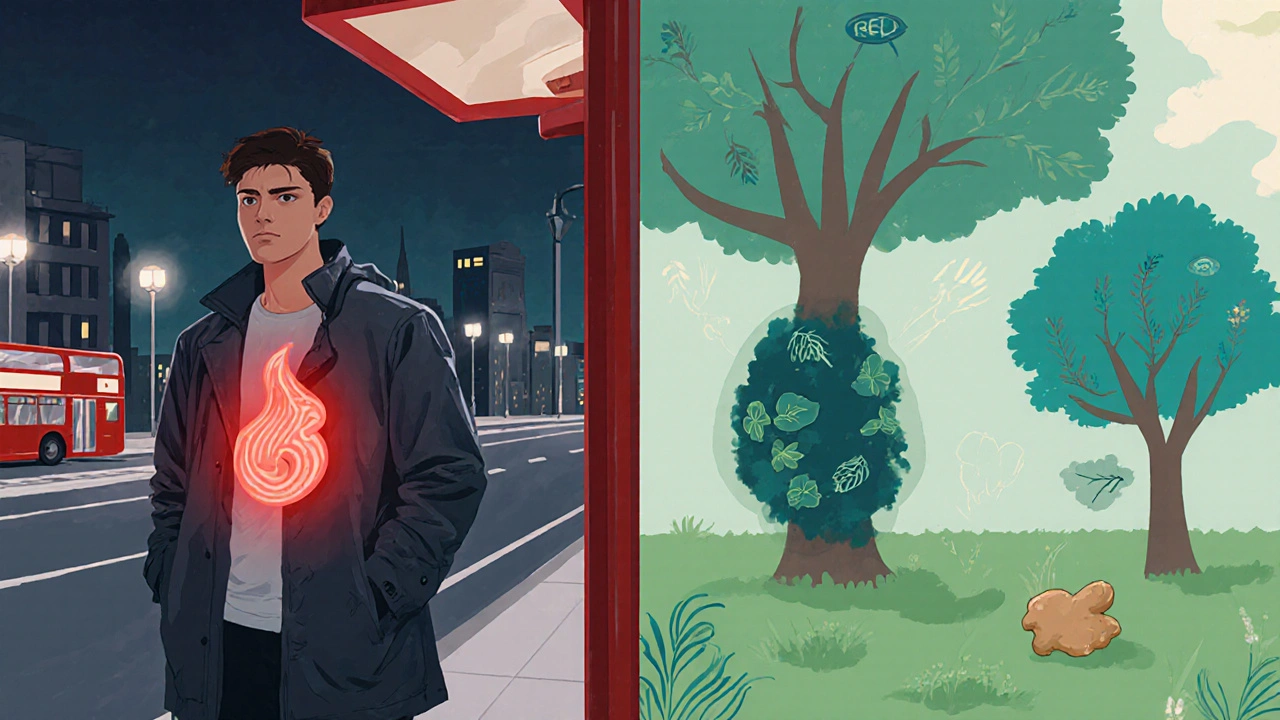
Spotting When They’re the Same Problem vs. Separate Issues
If both sensations flare up after the same trigger-say, a greasy burger or a nightcap-they’re likely linked by the same reflux pathway. The pain usually follows a pattern: a burning flash behind the breastbone (heartburn) followed minutes later by a dull ache in the upper abdomen.
When the timing diverges, or when the stomach ache is accompanied by nausea, bloating, or changes in bowel habits, you might be dealing with a separate condition such as gastritis, a gallstone, or even irritable bowel syndrome (IBS). In those cases, treating reflux alone won’t clear the abdominal pain.
Red‑Flag Symptoms You Shouldn’t Ignore
While occasional heartburn and mild stomach ache are common, certain warning signs demand a doctor’s evaluation:
- Vomiting blood or material that looks like coffee grounds.
- Black, tarry stools (possible bleeding in the upper GI tract).
- Unexplained weight loss of more than 5% in a month.
- Difficulty swallowing or a feeling that food is stuck.
- Pain that wakes you up at night and lasts more than a few weeks.
These symptoms can indicate severe erosive esophagitis, an ulcer, or even early-stage esophageal cancer, so prompt medical attention is key.
Managing Both Discomforts: Lifestyle + Over‑the‑Counter Options
Before reaching for medication, try these simple adjustments:
- Eat smaller, more frequent meals; avoid large, fatty plates that increase pressure on the LES.
- Limit caffeine, alcohol, chocolate, citrus, and tomato‑based foods, all common reflux triggers.
- Stay upright for at least 2‑3 hours after eating; a brief walk helps digestion.
- Elevate the head of your bed by 6‑8 inches to reduce nighttime reflux.
- Manage stress through deep‑breathing, yoga, or short meditation breaks; stress can heighten acid production.
When lifestyle tweaks aren’t enough, over‑the‑counter (OTC) options can provide relief:
- Antacids (e.g., calcium carbonate) neutralize excess acid quickly, soothing both heartburn and mild stomach ache.
- H2 blockers (e.g., famotidine) reduce acid output for up to 12 hours, ideal for occasional flare‑ups.
- Proton‑pump inhibitors (PPIs) like omeprazole are more potent, suitable for frequent GERD symptoms but should be used under guidance if longer than a few weeks.
If you suspect an ulcer or H. pylori infection, a short course of antibiotics combined with a PPI is the standard treatment-always prescribed by a clinician.
Prevention: Keeping Both Issues at Bay
Long‑term prevention hinges on keeping acid where it belongs and protecting the stomach lining. Here are actionable habits:
- Maintain a healthy weight; excess belly fat presses on the abdomen and can open the LES.
- Choose a diet rich in fiber, lean proteins, and non‑acidic vegetables.
- Avoid tight clothing around the waist that can squeeze the stomach.
- Limit NSAID use (ibuprofen, aspirin) unless prescribed; these drugs can erode stomach lining.
- Schedule regular check‑ups if you have chronic reflux-early detection of esophagitis or Barrett’s esophagus can prevent complications.
| Aspect | Heartburn | Stomach Ache |
|---|---|---|
| Typical Location | Behind breastbone, often radiates to throat | Upper or lower abdomen, may be localized |
| Common Triggers | Spicy/fatty foods, lying down, caffeine | Overeating, ulcers, infections, stress |
| Primary Cause | Acid reflux through a weak LES | Irritation of gastric lining or organ-specific issues |
| Relief Methods | Antacids, PPIs, upright posture | Heat packs, antacids, H. pylori eradication |
| When to See a Doctor | Nighttime pain, vomiting blood, dysphagia | Severe, persistent pain, black stools, fever |
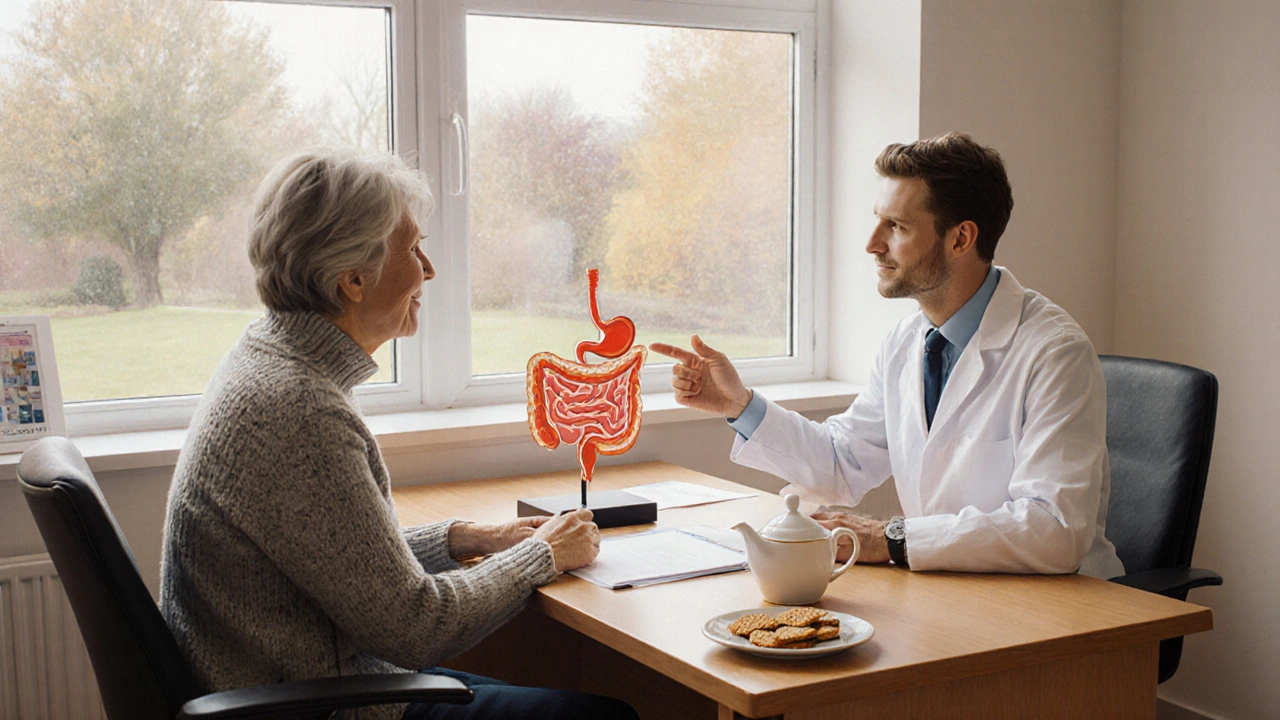
Frequently Asked Questions
Can heartburn cause a stomach ulcer?
Heartburn itself doesn’t directly create ulcers, but chronic acid reflux can erode the esophageal lining and, over time, increase the risk of developing ulcers in the stomach or duodenum.
Why does my stomach ache get worse after I take antacids for heartburn?
Antacids neutralize acid quickly, which helps heartburn but may temporarily raise stomach pH. Some people experience a feeling of “fullness” or mild cramping because the stomach’s acid balance shifts, especially if the underlying cause is an ulcer.
Is it safe to use PPIs every day for both heartburn and stomach ache?
Long‑term daily PPIs are generally safe for most adults, but they can reduce absorption of magnesium and vitamin B12, and increase risk of bone fractures. Use them under a doctor’s guidance, especially if you need them for more than a few months.
Can stress cause both heartburn and stomach pain?
Yes. Stress can stimulate excess stomach acid, relax the LES, and heighten sensitivity to pain, leading to simultaneous heartburn and abdominal discomfort.
When should I see a gastroenterologist?
If you have frequent heartburn (more than twice a week) combined with persistent stomach ache, or any red‑flag symptoms like vomiting blood, unexplained weight loss, or difficulty swallowing, schedule an appointment with a gastroenterologist for further testing.
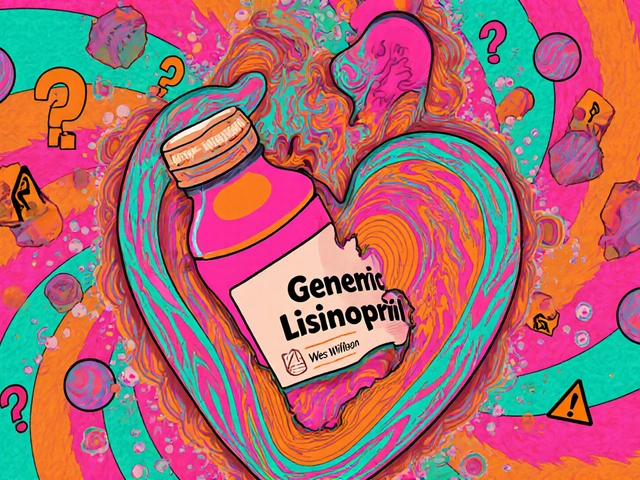
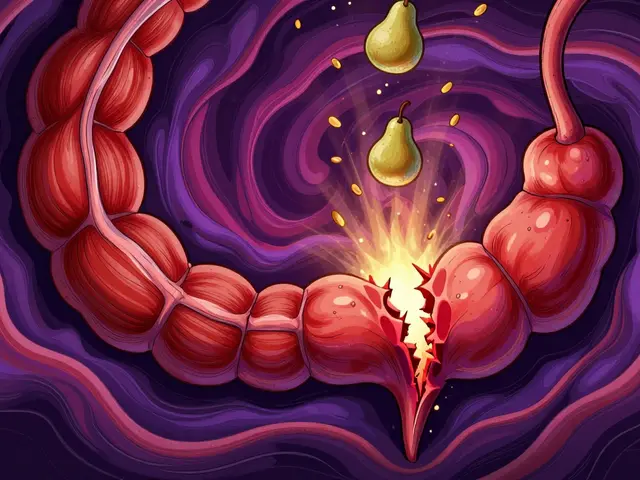



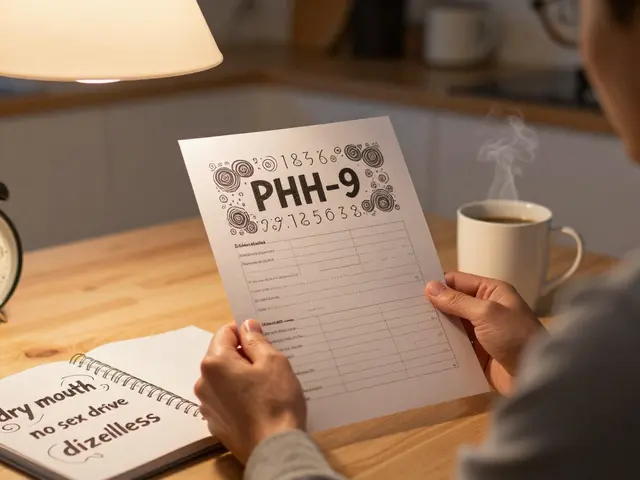
Amanda Anderson
September 29, 2025 AT 01:15Heartburn and stomach ache often show up together, and that’s not a coincidence.
Both symptoms can be triggered by the same underlying problem, such as acid reflux.
When the lower esophageal sphincter relaxes too much, stomach acid backs up into the esophagus, causing that burning feeling.
At the same time the excess acid can irritate the lining of the stomach, leading to cramping.
Eating a heavy, fatty meal can exacerbate the pressure in the abdomen, pushing acid upward.
Lying down soon after eating removes gravity’s help, so both pain and burn intensify.
Stress plays a sneaky role by slowing digestion and increasing acid production.
Smoking and alcohol also relax the sphincter, making the two complaints more likely to appear together.
Certain medications, like NSAIDs, can erode the stomach lining, adding to discomfort.
For many people, simple lifestyle tweaks can break the cycle.
Try smaller, more frequent meals and keep a food diary to spot triggers.
Elevating the head of the bed by a few inches helps keep acid where it belongs at night.
Over‑the‑counter antacids or H2 blockers can give quick relief, but they don’t fix the root cause.
If symptoms persist for more than a couple of weeks, it’s wise to see a doctor for possible GERD testing.
Remember, listening to your body and adjusting habits is the first step toward lasting comfort.
Carys Jones
September 29, 2025 AT 01:18The quiz feels like a gimmick, offering false reassurance while ignoring real medical nuance. It pushes a one‑size‑fits‑all answer, which is irresponsible for something as serious as potential GERD. People deserve better than a pop‑up checklist.
Roxanne Porter
September 29, 2025 AT 01:21While the article gives a solid overview, it would be helpful to include references to clinical guidelines. A more collaborative approach could involve linking to reputable sources such as the Mayo Clinic or NIH for readers seeking deeper insight.
Jonathan Mbulakey
September 29, 2025 AT 01:25One might contemplate the relationship between mind and gut, recognizing that anxiety can amplify perception of pain. Yet, the physiological mechanisms described remain the cornerstone of why these symptoms co‑occur.
Warren Neufeld
September 29, 2025 AT 01:28I’ve seen many folks dismiss these signals as “just heartburn,” only to find the problem worsening over months. Listening to your body and seeking professional advice early can prevent complications.
Dipankar Kumar Mitra
September 29, 2025 AT 01:31Don’t ignore the warning signs! The body is screaming for help, and continuing the same habits is sheer self‑sabotage. Change your routine now or face chronic discomfort.
Tracy Daniels
September 29, 2025 AT 01:35For anyone experiencing these symptoms, consider keeping a detailed log of meals, posture, and stress levels to identify patterns. Small adjustments can lead to big improvements 😊.
Hoyt Dawes
September 29, 2025 AT 01:38Honestly, this article is just another piece of generic health fluff. If you wanted real depth, you’d need to dig into the research yourself.
Jeff Ceo
September 29, 2025 AT 01:41Let’s keep the discussion focused on factual advice rather than personal anecdotes that may mislead others.
David Bui
September 29, 2025 AT 01:45While I respect the intent, the piece could use more precise language and correct punctuation its missing in places its not just a stylistic choice its a clarity issue also consider adding citations for credibility
Alex V
September 29, 2025 AT 01:48Sure, because the government totally hides the truth about heartburn cures.